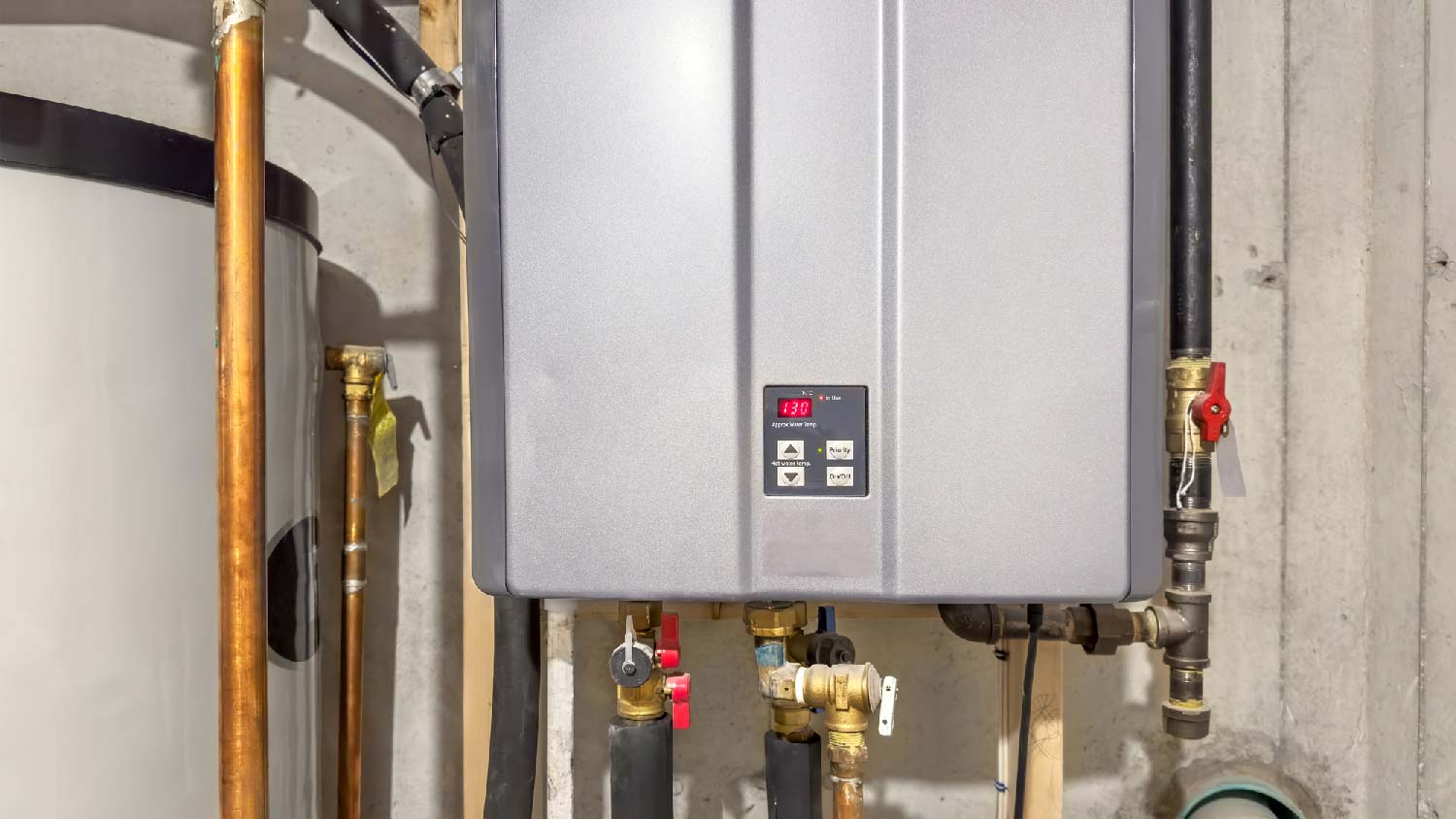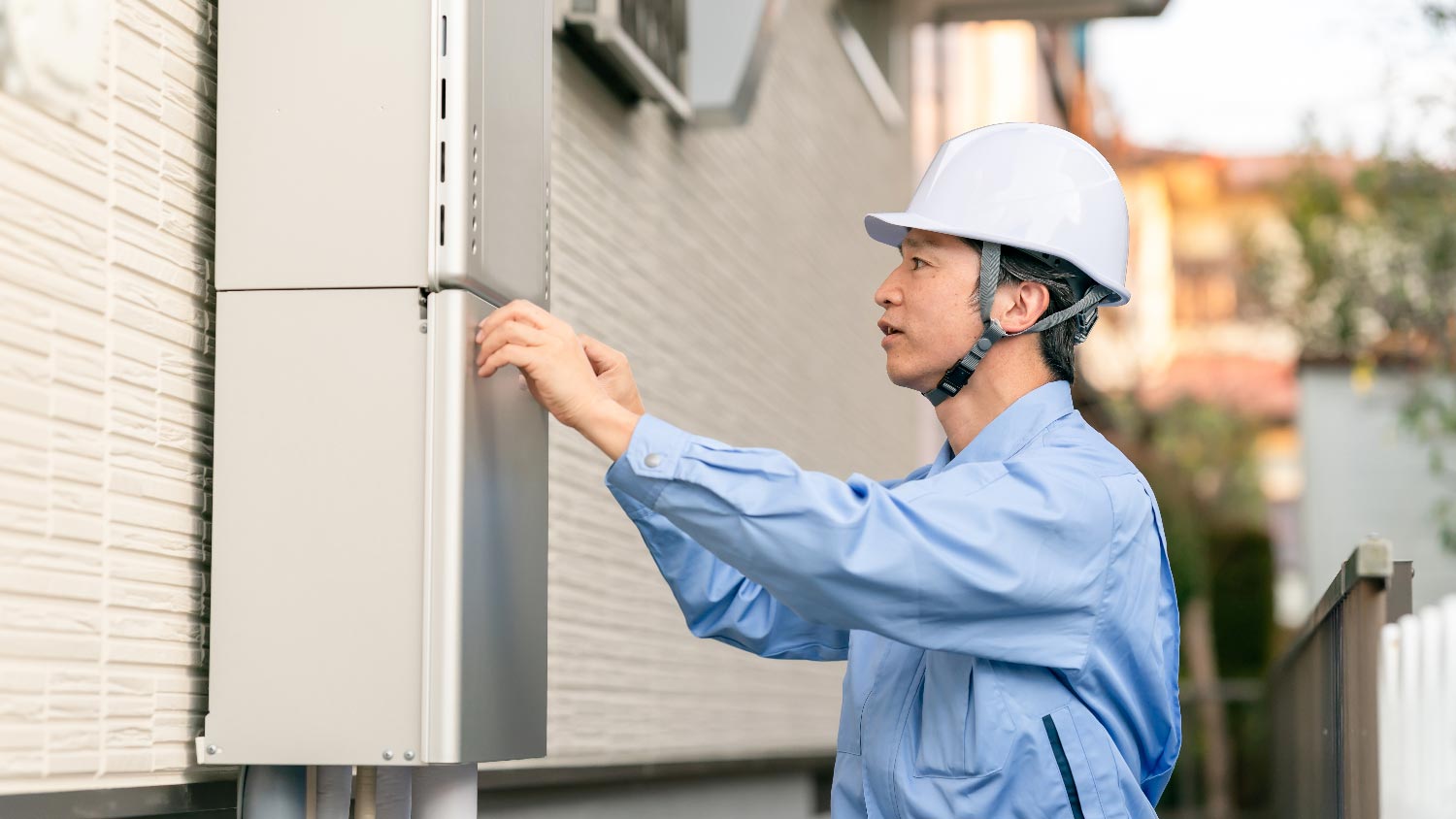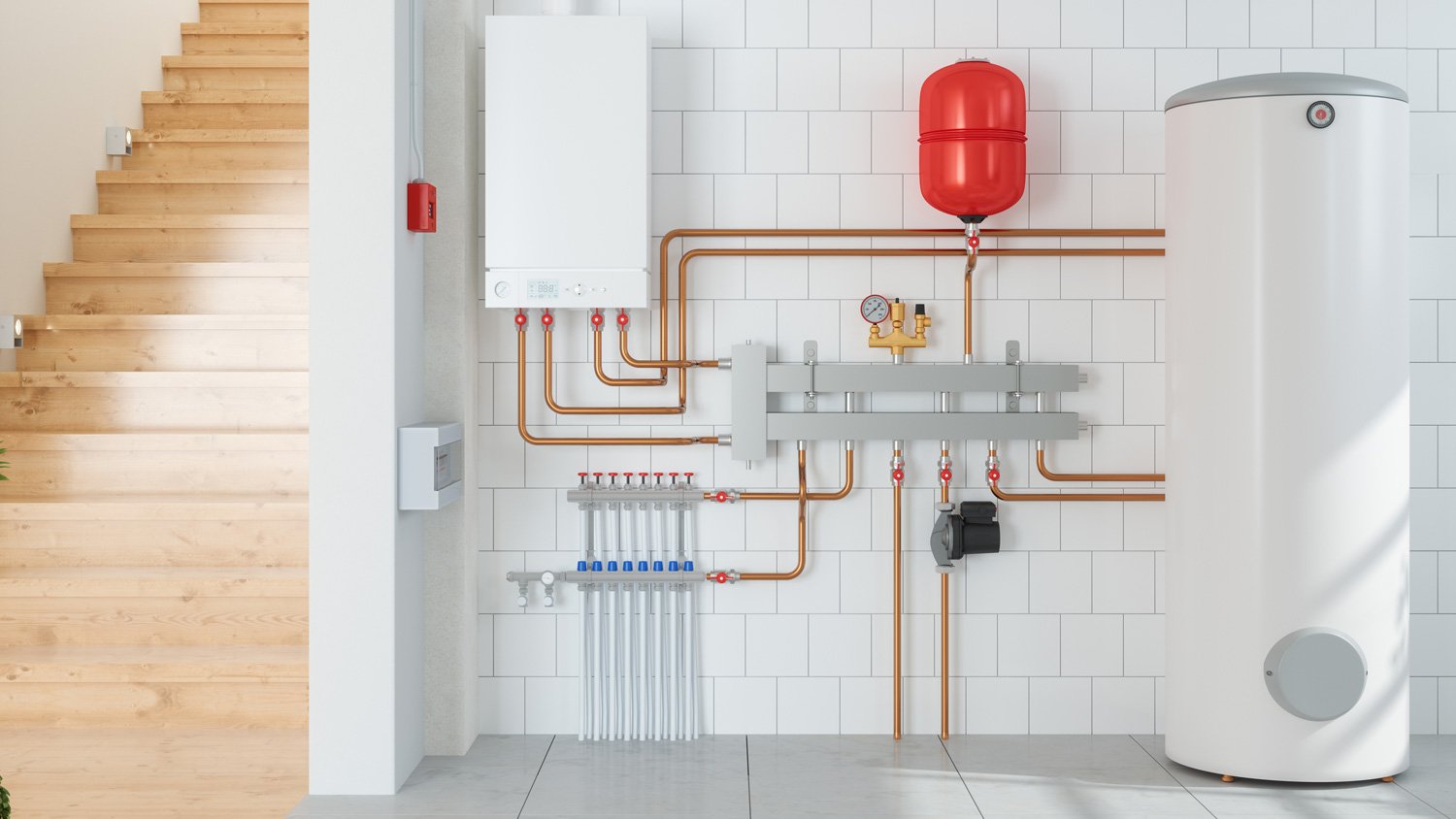Does a Tankless Water Heater Increase Home Value?
See if a tankless water heater could increase your home’s value


Home Value Rating: 2/5
A tankless water heater can add some value with a pro’s expertise.
You can save around 8% to 34% of energy with a tankless water heater compared to a conventional tank water heater, according to Energy.gov.
A study by Zillow suggests that tankless water heaters increase home values by approximately 1.2%.
If you have signs you need a new water heater, then you may want to consider making the switch to a tankless water heater. A tankless water heater can lead to energy savings ranging from $32 to $200 and a $4,800 increase in the value of a typical $400,000 home.
The collective value of a tankless water heater depends on its location, size, type, and more. Learn about the return on investment (ROI) to see if it’s worth installing one.
Factors That Influence Tankless Water Heater Values
Many factors can influence how valuable it is to install a tankless water heater, including the location, size of the water heater, number of water heaters, type of water heater, installation, energy efficiency, and potential tax credits.
Location
Where you live could impact installation costs, impacting how much you could save by switching to a tankless water heater. For example, tankless water heaters cost between $1,000 and $2,900 on average in Orlando, Florida, while in Minneapolis, Minnesota, residents spend between $1,900 and $6,100. Factor in the cost of living in your region and local quotes from plumbers to get a good feel for what you might pay.
Size
Larger homes may need a larger tankless water heater size to provide continuous hot water throughout the home. While this might mean you’ll pay more for your water heater, you could also see a larger ROI overall.
Here’s a breakdown of home prices and the estimated resale value based on research from Zillow stating homes sold for 1.2% more if they had a tankless water heater installed:
| Home Cost | Average Resale Value |
|---|---|
| $100,000 | $1,200 |
| $200,000 | $2,400 |
| $300,000 | $3,600 |
| $400,000 | $4,800 |
| $500,000 | $6,000 |
| $600,000 | $7,200 |
| $700,000 | $8,400 |
| $800,000 | $9,600 |
| $900,000 | $10,800 |
| $1,000,000 | $12,000 |
Single-Point vs. Whole-House System

There are two types of tankless water heater systems, including a single-point tankless water heater and a whole-house tankless water heater system. A single-point system only heats one system, like a shower or faucet, while a whole-house system—you guessed it—heats all of the primary sources in your home. On average, single-point systems cost between $100 and $300 compared to whole-house systems, which can range from $450 to $1,500.
Since a whole-house system heats your entire home, you’ll see greater energy savings and a potentially higher ROI compared to a single-point system. However, some homeowners prefer to install several single-point systems or utilize this type of system in an accessory dwelling unit. This can further increase your ROI.
Tankless Water Heater Type
The type of tankless water heater you choose can also affect your total savings. The Department of Energy states that the typical electricity bill for heating water in the U.S. is $400 to $600 per year. With your potential energy savings ranging from 8% to 34% for electric and gas tankless water heaters, you’ll save anywhere from $32 to $200 yearly.
However, tankless solar water heaters are around 50% more energy efficient than conventional water heaters. Solar water heaters cost more than gas and electric tankless water heaters, coming in between $1,800 and $5,700.
Check out the breakdown below:
| Tankless Water Heater Type | Energy Efficiency | Average Yearly Savings |
|---|---|---|
| Gas water heater | 8%–34% | $32–$200 |
| Electric water heater | 8%–34% | $32–$200 |
| Solar water heater | 50% | $200–$300 |
DIY vs. Hiring a Pro
While some tech-savvy homeowners may know how to install a tankless water heater, we don’t recommend doing it yourself for this project. Installing the wrong-sized tankless water heater can overload your system, shorten its life, and fail to properly provide hot water throughout the home. Poor workmanship from a botched DIY project can also lower your ROI or eliminate it entirely.
For these reasons, you should work with a qualified water heater installation company near you to ensure you have the right system size and high-quality installation to make the most of your purchase. Plumbers charge anywhere from $45 to $200 per hour depending on the cost of living in your area.
Energy Efficiency
According to Energy.gov, households using 41 gallons or less of hot water per day may have 25% to 34% more energy efficiency than traditional storage tank water heaters. Homes that use significantly more water—such as 86 gallons daily—will see energy savings between 8% and 14% on average.
Water Heater Tax Credit
Eligible natural gas tankless water heaters can receive a 30% natural gas tax credit of up to $600 maximum through 2032. Tankless water heaters must use natural gas and meet ENERGY STAR standards with ≥ 0.95 Uniform Energy Factor (UEF). Solar water heaters for indoor dwellings are also eligible for a 30% solar tax credit through 2032. This Residential Clean Energy Tax Credit decreases to 26% in 2033, 22% in 3034, and expires in 2035.
How to Estimate the Added Value of Tankless Water Heaters
A variety of factors can influence the ROI of tankless water heaters, making it challenging to know exactly how much value installing one can add to your home. Since each factor varies depending on your home, lifestyle, and environment, you'll need to look at potential savings from multiple angles to calculate your ROI best. There may even be other factors not mentioned that could influence whether or not a tankless water heater is worth the investment.
Still, here are a few steps for estimating the added value of a tankless water heater in your home.
Look at comparable homes. Look at recent home sales for properties of a similar size and feature to your home. See if there’s a noticeable difference in the final price for homes with and without tankless water heaters to estimate potential added values.
Consider market demand. If tankless water heaters aren’t in high demand in your area, you might not see a big return on your investment. Look at local home improvement stores and water heater installation company websites to see if they offer or feature installation and maintenance services.
Calculate the cost of a tankless water heater against returns. Factor in the type of tankless water heater, labor, hot water demand, and permits to see if a tankless water heater is worth the investment.
Get appraised. Hire a property appraiser near you to assess your home's market value professionally and estimate possible value increases with a tankless water heater.
Cost to Install a Tankless Water Heater

Tankless water heater costs range from $1,400 to $3,900. This is higher than the cost of a conventional tank water heater, which is between $600 and $2,500. The majority of the price tag comes from the unit and labor, with labor accounting for around 45% of the cost. Permits and materials play a smaller role in the price of a tankless water heater.
You’ll spend roughly $800 to $1,400 more on a tankless water heater than you would on a conventional water heater. However, with energy savings of up to 34% and a water heater lifespan of around eight to 12 years longer than tank water heaters, these higher up-front costs can turn into financial savings over the years.
Is a Tankless Water Heater Worth It?
Whether a tankless water heater is worth it or not boils down to comparing the cost of the water heater to the energy savings and possible resale value. Remember that the average tankless water heater costs $2,600. You could save $32 to $200 annually on your utilities, helping to save on the high up-front cost. That’s on top of the average resale value increase of 1.3% after installing a tankless water heater.
Compare the cost of the tankless water heater to the potential energy savings to see how quickly you might pay off the cost of your water heater through lower electricity bills. Then, talk with an appraiser to see if installing this type of water heater in your area could increase the value of your home.
Not all situations are made equal, so it’s also important to consider the type of tankless water heater, your home’s water usage, and regional demand when calculating your potential ROI.
| Pros | Cons |
|---|---|
| Increased property value | Costly investment |
| Instant hot water | Fuel type impacts energy efficiency |
| Less storage space needed | Limited demand for hot water |
| Longer lifespan | Local permit requirements may apply |
How Angi Gets Its ROI Data
Home is the most important place on earth, which is why Angi has helped more than 150 million homeowners transform their houses into homes they adore. To help homeowners maximize the value of their investments, we gather ROI data from reputable sources, including industry reports, real estate studies, and interviews with market experts. We calculate the average resale value for projects by multiplying the ROI against the project’s average cost according to our cost data, which is sourced from thousands of real Angi customers.
Want to help us improve our data? Send us a recent project quote or home appraisal value to costquotes@angi.com. Quotes and personal information will not be shared publicly.
Frequently Asked Questions
A tankless water heater can save money in terms of energy usage. Because this design only heats the water on demand, you’re not using energy to continuously heat water sitting inside a tank when no one is using it. According to the U.S. Department of Energy, a tankless water heater is 8% to 34% more energy efficient than a conventional water heater with a tank. Larger households that use a lot of hot water will see efficiency closer to 8%, while small households that use less hot water will be closer to the 34% mark.
A tankless water heater can last up to 20 years, but just how long your tankless water heater lasts depends on how much water you use, how well you maintain your water heater, and the water hardness level in your area. A unit that constantly has mineral buildup from hard water may have a shorter life span.
Yes, you can replace a current tank water heater with a tankless model or vice versa. If you’re maintaining the same fuel source—gas or electricity—the switchover should be smooth. A conventional tank requires open floor space, while a tankless model can be wall-mounted. If you’re switching to a tank water heater, you might need to clear space for it. Gas-powered tankless water heaters need a large volume of gas when they start running to heat the water instantly. You might need to increase the size of the gas line when going from a tank to a tankless model.




- Key Pros and Cons of a Tankless Water Heater
- Can You Use a Tankless Water Heater in Cold Climates?
- How To Install a Tankless Water Heater
- Tankless Water Heaters vs. Storage Tank: Key Differences
- The 5 Biggest Myths About Tankless Water Heaters
- How Long Does a Tankless Hot Water Heater Last?
- What to Do if Your Tankless Water Heater Freezes
- How Does a Tankless Water Heater Work and What Sets It Apart?
- Comparing Heat Pump vs. Tankless Water Heaters
- Who Fixes Tankless Water Heaters? Everything You Need to Know











